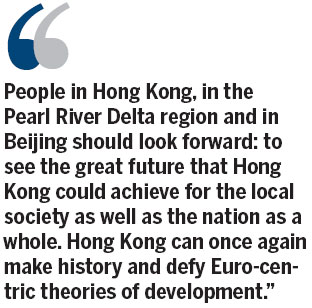What is Hong Kong's role?
Updated: 2013-10-29 06:50
By Thomas Chan(HK Edition)
|
|||||||||
To many people this is not a question or an issue. They take for granted what they see, what they know and what they are told. But, everyone should have their conception and understanding of this entity called Hong Kong. The latter represents the diversity and the democratic nature of society, which is also the foundation for innovation and change.
Hong Kong started as a British colony imposed upon China by military force. It has never been and never will be independent and self-sufficient. This is why the British from the beginning declared it a free trade port to allow all people (mainly Chinese) to trade in it. The new colony needed labor and merchants and just like the case of early Singapore, the British allowed the free movement of Chinese in and out of the colony without any registration and restrictions. The status quo continued right up to early 1950s until the encirclement of and sanctions against the People's Republic of China by the US and its allies after the outbreak of the Korean War.
Hong Kong has never been segregated from other parts of China and the Pearl River Delta region in particular. Now, the easing of entry requirements and the flood of mainland visitors to the city is reminiscent of the relationship between Hong Kong and the mainland in the pre-Korean War era. 
With more residents in the Pearl River Delta region visiting Hong Kong frequently for shopping, the former British colony is reuniting culturally and socially, not just economically with the place of origin of most its residents. When Guangzhou started the campaign to preserve Cantonese, Hong Kong society responded enthusiastically and joined hands with Guangzhou. This shows the strong cultural bond between the two major cities of the Cantonese communities.
The division of labor between Guangzhou and Hong Kong in the region has become increasingly clear: Guangzhou is the domestic link while Hong Kong is the international link. Both cities will become service economies rather than manufacturing ones, the role of which has been and will be allocated to other minor cities in the region, and even beyond, when the high-speed railway network expands the hinterland of the Pearl River Delta region.
After 1997, Hong Kong has had no political justification to challenge the legitimacy and authority of the national government, nor is it in a position to challenge the economic centrality of Guangzhou in the Pearl River Delta region. Its political destiny and geo-economic location have denied it any chance of leading or disintegrating from the region. A separate cultural identity may be possible given the divergent path of development of Hong Kong from the 1950s to 1990s, but the distinction is blurring today because of the intensifying exchanges and integration of Hong Kong with the region.

So Hong Kong is both the insider and outsider of China, to a greater extent than Guangzhou. Like the latter, Hong Kong has existed only within China, economically, socially, culturally and politically. It is not Singapore, an enclave created first by British colonialism and then by the players of Pax Americana. Hong Kong should be more active in the international arena than Singapore given the strong support of the soon-to-be largest economy in the world.
Guangzhou has never had any international initiative, be it economic or political. Hong Kong, under the "One Country, Two Systems" principle and the huge social and economic resources it has accumulated is in a much more favorable position to exert its international influence. It can help turn the Pearl River Delta region into one of the most aggressively growing and externally oriented economic regions in the world.
When we conceptualize Hong Kong, we should not look backward. People in Hong Kong, in the Pearl River Delta region and in Beijing should look forward: to see the great future that Hong Kong could achieve for the local society as well as the nation as a whole. Hong Kong can once again make history and defy Euro-centric theories of development.
The author is director of the Public Policy Research Institute and head of China Business Center at Hong Kong Polytechnic University.
(HK Edition 10/29/2013 page9)